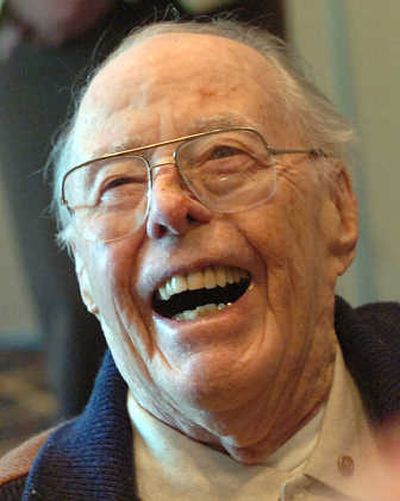Huckleberries gone wireless: ‘Ace’ describes his burger habit, 1935 hole in one

Centenarian Ace Walden, a retired Coeur d’Alene banker and longtime volunteer, is the subject of Huckleberries Gone Wi-Fi this week. Walden took part in starting the North Idaho College Foundation and the Walden House, named after his late wife, Ellen, and himself.
D.F. Oliveria: How many Hudson Hamburgers have you eaten?
Ace Walden: I’m no stranger to Hudson Hamburgers. I knew Harley Hudson when he met the trains with his pushcart. I send for them now. A caretaker gets three of them for me. He eats two. I eat the other one.
DFO: Any secret for living so long?
AW: Just lucky.
DFO: When was the golden age of Coeur d’Alene?
AW: Today. All of the development that’s going on. All the businesses that are coming here. All the buildings that are being built. When I came here (by boxcar in 1911), there were only 4,000 people. Government Way was the western limits for the city. Harrison (Avenue) was the northern city limits. The eastern city limits was between 10th and 11th street.
DFO: Who would you consider to be the top Coeur d’Alene mayor during your lifetime?
AW: You can’t beat the present mayor. Sandi Bloem does a gorgeous job.
DFO: You got your nickname by shooting a hole in one. Have you ever shot another hole in one?
AW: No. I bought one of the original units at the Hayden Lake Country Club. They sold 150 units for $250 apiece to get the money to buy the tavern and golf course. The railroad sold the land for $30,000. I bought the unit when I didn’t have a car or own a golf club. The dues were only $25 per year. I made hole in one May 31, 1935 (Memorial Day). They started calling me “Ace” at the bank the next day. I liked that.
DFO: Isn’t your first name really Amidee?
AW: Yes. When my folks left San Francisco after the big earthquake and fire, they met some French people who were studying gold mining in Grass Valley, Calif. They spent two years there. I showed up then. The (surname) of the French couple was Amidee. I got my nose broken several times fighting boys who pestered me about that name – and twice playing football.
DFO: Wasn’t your first job selling the Spokane Daily Chronicle at age 6?
AW: My older brother and I got a brand new nickel among Christmas presents when we were in the first grade. He was held back a year so we could go to first grade together. He had the idea of selling newspapers. The Chronicle came in at 3:30 in the afternoon. We bought two newspapers for a nickel and sold them for a nickel apiece at the electric dock where the boats and trains came in.
DFO: Wasn’t it hard to be a banker during the Depression?
AW: I was put on an apprenticeship when I went to work on Oct. 14, 1930, at American Trust Co. That was close to the middle of the big Depression. Banks were closing in lots of places. They weren’t making money. People were burying money in the backyards. I don’t blame them. I listened carefully once in a while to see if I was being called a “banker” or a “bastard.”
DFO: You met your wife in the first grade. Was it love at first sight?
AW: It wasn’t. Miss Pennington … would walk up and down the rows asking questions about what we were learning. One day, she was teaching us about big capital letters and little capital letters. She asked me to draw a capital Q. I did. She said it looked more like a “2.” Ellen came over and turned my penny tablet over. She drew on it and said, ‘That’s what it’s supposed to look like.’ That was at Bryan School on Harrison.
DFO: Haven’t you written a book about your life?
AW: Yes. There are 15 copies. It isn’t copyrighted. It will be made public after I’m gone. I don’t mention names.